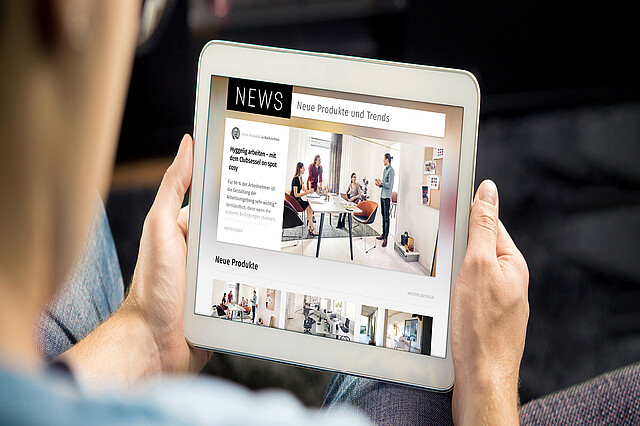The merging of work and life

Hybrid working means that work and private life are becoming more intertwined. Technological advances mean that many tasks can be carried out from almost anywhere, whether in the office, at home or on the move. This flexibility brings numerous benefits: employees can manage their time more flexibly, which allows them to better respond to individual needs and achieve a good work-life balance. At the same time, the freedom to work in different environments allows them to increase their creativity and productivity.
However, this merging of work and private life also poses challenges. Without clear boundaries between the two areas, constant availability can lead to overload. While digitalisation has made it easier to work from anywhere, constant connectivity also carries the risk of digital exhaustion. Well-being plays a key role here: only those who feel mentally and physically well can be productive and creative in the long term.
The importance of well-being in hybrid working models

Well-being in the workplace is now more than ever a decisive factor for productivity. Companies are increasingly recognising that satisfied employees are not only more productive, but also create a more positive working environment. Hybrid working models offer new opportunities to actively promote the well-being of employees.
On the one hand, flexible working hours and the ability to choose their own place of work allows employees to respond more individually to their needs. Employees can therefore adapt their work to their personal rhythm of life, which leads to less stress and greater satisfaction. On the other hand, hybrid models promote new forms of collaboration and interaction that go beyond the traditional office routine. This supports the creation of an open and innovative corporate culture.
How an office café strengthens well-being and corporate culture

A key element that plays a role in hybrid office models is flexible workspaces - and this includes the office café. Such a space offers more than just the opportunity to take a break or have a coffee. It can promote the well-being of employees by creating a relaxed, communicative atmosphere in which creativity and social interaction can flourish.
An office café can have a positive impact on the working environment in several ways:
Promoting social interaction: in an office café, employees have the opportunity to meet and exchange ideas informally. This not only promotes team spirit, but also informal discussions that often lead to new ideas and creative solutions. Especially in hybrid working models, where employees are not in the office every day, such meeting spaces are important to strengthen the bond with the team and the corporate culture.
Relaxation and regeneration: A well-designed office café offers employees the opportunity to recover from work and recharge their batteries. Breaks in a pleasant environment are essential to maintain concentration and productivity throughout the day. By combining work and relaxation, employees can tackle their tasks with renewed vigour.
Creating an inspiring atmosphere: An office café is not just a break room, but also a place that encourages creativity. A relaxed, aesthetically pleasing design with comfortable seating, good lighting and pleasant acoustics can help employees feel at ease and work in an inspiring environment. This leads to increased motivation and satisfaction.
Support for hybrid working culture: Flexible workspaces play a central role in hybrid working models where employees work both on site and remotely. An office café can serve as a central meeting point where employees can network and collaborate flexibly. It is a space that facilitates the transition between formal and informal work and thus reflects the new work culture.
An office café as the key to sustainably promoting well-being and corporate culture
In a hybrid working world where flexibility and well-being are paramount, the office café is more than just a place to relax. It actively contributes to increased productivity and promoting an open, creative corporate culture. By creating meeting spaces that enable social interaction and regeneration, companies can sustainably support the well-being of their employees and thus make a positive contribution to a modern work culture.
Hybrid work requires not only technological adaptations, but also a redesign of the physical and social working environment. An office café is an example of how companies can master this challenge and at the same time create a working environment that combines well-being, creativity and productivity.
social media channels:


